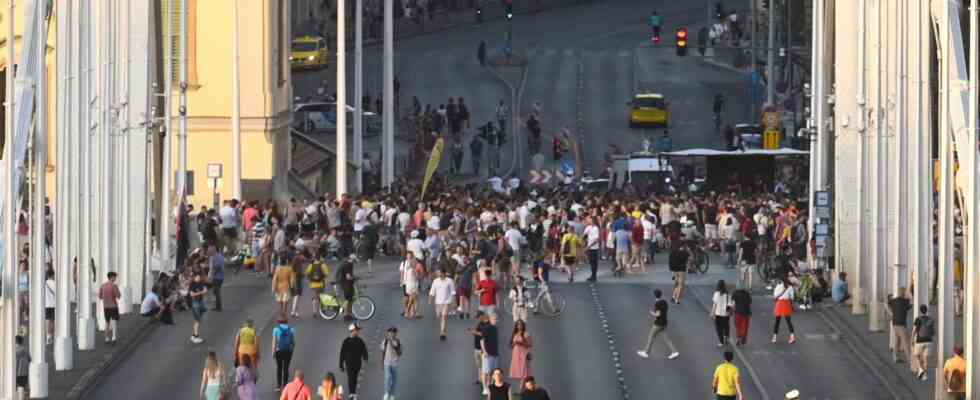Status: 07/15/2022 01:52 a.m
For the third day in a row, anti-government demonstrators blocked a bridge over the Danube in the Hungarian capital Budapest. They protest against a tax increase for freelancers.
Demonstrators are once again marching across the Erzsébet Bridge from Pest to Buda to vociferously protest the tax change that hit them all out of the blue. Around 450,000 freelancers are affected, who are likely to face an increase in income tax – from the beginning of September. Thousands of people took to the streets in Budapest on Tuesday evening and blocked two important Danube bridges for hours.
Sole proprietorships and small businesses, such as graphic artists, actors, journalists, bicycle messengers and artists, are not only upset about the extent of the income tax increase. Around three quarters of freelancers have to reckon with significant losses in their net income, as forecast by the Association of Tax Advisors. There is talk of 20 to 40 percent among those affected.
Whipped through Parliament
The speed and manner in which the Orban government has implemented the abrupt tax hike is also causing great irritation. Less than 24 hours elapsed between the bill being tabled on Monday and being passed in Parliament on Tuesday of this week. The debate in Parliament lasted two hours, and then the vote was taken.
Ferenc Gelencér, member of parliament and chairman of the opposition Momentum party, is outraged: This is “net high treason.” The Orban government, which untruthfully claims to be family-friendly, is now letting “450,000 people, 450,000 KATA entrepreneurs and their families down.”
Actors, bicycle couriers or artists take part in the protest. You face higher tax payments from September.
Image: AFP
Old regulation repealed
KATA was introduced by the Fidesz government in 2013 and is now largely being cashed in again: what is meant is the “flat-rate tax for companies that are subject to low taxation”. The idea: low-income sole proprietors who earn no more than just under 30,000 euros a year should not need a tax consultant or accountant to declare their income tax.
Instead, a kind of flat tax applied: So far, sole proprietors have had to pay around €120 per month, sometimes a higher amount of €185. This means they meet their tax and social security obligations. However, your pension will be very low because of the low contribution payments. In two and a half months, this will be the end of the majority of low-income freelancers.
Government stands by its position
So far, the current protests have not changed the government’s decision, which was only re-elected in April with a two-thirds majority. Prime Minister Viktor Orban’s Fidesz party had its communications director explain that it was about correcting an undesirable development. István Hollik said on Hir TV that it was “bogus employment,” tax tricks, and they wanted to stop them. Workers were “forced to use KATA because it could save companies money.”
Since his re-election in the spring, Orban has faced his toughest economic and fiscal challenge to date. The consequences of the Russian war of aggression against Ukraine and the ongoing conflict with the European Union are making their mark on the state budget and on the wallets of the population. The national currency, the forint, is depreciating significantly, and inflation is around ten percent.
Billion dispute with the EU
Above all, however, the dispute with the EU is costing the country dearly. The European Commission has blocked the 15 billion euros that Hungary would receive from the Brussels Corona Recovery Fund. The Bloomberg news agency estimates that if Prime Minister Orban does not reach an agreement with the EU on anti-corruption and the rule of law this year, Hungary will lose access to 70 percent of this billion-dollar sum.
The first attempts to pull the fiscal emergency brake can already be seen: on Wednesday the government cut one of its flagship projects. Eight years ago, Orban effectively froze the ancillary costs for electricity and gas. That is now no longer possible. From August, households that use more than a certain amount of energy would have to pay significantly more.
Thousands demonstrate in Budapest over abrupt tax hike
Clemens Verenkotte, ARD Vienna, July 14, 2022 9:12 p.m

